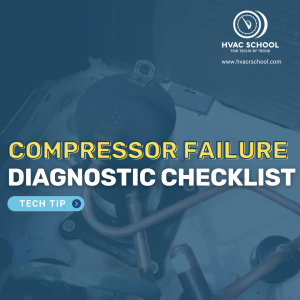Podcasts
Listen and learn while you drive.

BRYAN ORR
Co-Founder and President at Kalos Services, Bryan has been involved in HVAC training for over 13 years. Bryan started HVAC School to be free training HVAC/R across many mediums, For Techs, By Techs.
Subscribe to free tech tips.

Real training for HVAC ( Heating, Ventilation, Air Conditioning and Refrigeration) Technicians. Including recorded tech training, interviews, diagnostics and general conversations about the trade.
In this episode of the HVAC School podcast, Bryan Orr sits down with Roman Baugh, a leading VRF (Variable Refrigerant Flow) specialist and co-host of the VRF Tech Talk podcast, for an in-depth exploration of VRF system maintenance. The conversation begins with some lighthearted back-and-forth before shifting to the technical realities of maintaining VRF equipment. Roman immediately addresses a common misconception: the idea that VRF systems are “maintenance free.” He explains that, contrary to some marketing claims, these systems require regular, specialized attention to ensure longevity and reliable performance.
Roman shares real-world stories that highlight the consequences of poor installation and lack of serviceability. He describes situations where VRF units are installed in hard-to-reach locations—like cabinets or hard-lid ceilings—making even basic maintenance a costly and invasive process. This lack of foresight often leads to significant expenses for property owners, especially when major repairs require extensive drywall work just to access failed components. Roman emphasizes that proper maintenance starts with ensuring that systems are accessible and serviceable, a step too often neglected during installation.
The discussion delves into the specifics of VRF maintenance, moving beyond the basics of filters and drain lines. Roman explains how improper drain line installation can lead to persistent error codes and system shutdowns, particularly when condensate pumps are forced to exceed their design limitations. He goes on to detail the critical role of temperature sensors (thermistors), which are prone to failure from corrosion, moisture, and environmental factors—especially in challenging locations like laundry rooms. These sensor failures can cause misleading error codes and even compressor damage if not addressed promptly. Roman recommends regular sensor checks, especially as components age past their typical five-year lifespan.
A significant portion of the episode is dedicated to electronic expansion valves (EEVs), which are susceptible to rust, dried grease, and mechanical binding. Roman advocates for proactive inspection and, when necessary, preemptive replacement of EEVs to prevent catastrophic compressor failures. He introduces tools developed by technicians for technicians, such as the EEV Mate and custom EEV magnets, which allow for manual manipulation and diagnostics of expansion valves in the field. These innovations help HVAC professionals quickly triage and resolve issues, minimizing downtime and protecting expensive system components. The episode wraps up with a strong endorsement for ongoing education, technician communities, and the use of specialized tools and software to ensure VRF systems are maintained to the highest standard.
Topics Covered:
Debunking the “maintenance-free” VRF myth
Access and serviceability challenges in VRF installations
Proper drain line design, installation, and common failure points
The role and failure modes of temperature sensors (thermistors)
Environmental impacts on sensor and component reliability
Electronic expansion valve (EEV) maintenance and troubleshooting
Field-developed tools for EEV diagnostics (EEV Mate, EEV magnets)
The importance of commissioning and using service software
Application and installation quality as a foundation for long-term reliability
Technician communities, podcasts, and resources for VRF learning and support
This episode is essential listening for HVAC professionals seeking to deepen their understanding of VRF systems, avoid common pitfalls, and stay ahead with practical, field-tested maintenance strategies. For more insights, check out Roman Baugh’s VRF Tech Talk podcast and YouTube channel for additional resources on VRF technology and troubleshooting.
Check out the VRF Tech Talk podcast on YouTube HERE, or search for it on your favorite podcast app.
Have a question that you want us to answer on the podcast? Submit your questions at https://www.speakpipe.com/hvacschool.
Purchase your tickets or learn more about the 7th Annual HVACR Training Symposium at https://hvacrschool.com/symposium.
Subscribe to our podcast on your iPhone or Android.
Subscribe to our YouTube channel.
Check out our handy calculators here or on the HVAC School Mobile App for Apple and Android



